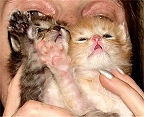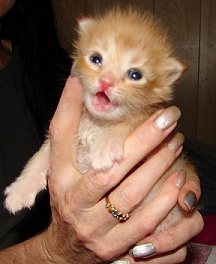
|
|
|
|||||||||||
|
|
|
Finding the right Kitten - Kitten or Cat? - Adopt a Cat for Life - Kitten Development - Kitten Age - Kitten Formula Recipe - Kitten Diet - Kitten Tips - Potty the Kitten - Kitten Hydration - Rehydrate the Kitten - Conjunctivitis - Runny Eyes - Eye Infections - Eye Discharge - Third Eyelid - Feline Infectious Diseases - (FIV) - (FeLV) - (FIP) - Feline Aids - Feline Leukemia - Rabies Vaccine - Feline Herpes Virus - Feline Distemper - Kitten Health Dangers - Kitten Ilnesses - Kitten Diseases - Preventative Care - Spaying and Neutering - Fixing - How to play with your Kitten - Kitten Toys - Kitten Bonding - Coccidial Infections (Coccidia) - Giardia - Cryptosporidium - Toxoplasmosis - Roundworms - Hookworms - Tapeworms - Pinworms - Whipworms - Fleas - Ticks - Ear mites - Injuries - Sneezing - Poisonous Plants - Cute Kitten Videos |
| Webdesign and Photos by SmilingPages.com in Support of the Rainbow Wildlife Rescue - Privacy Policy |

